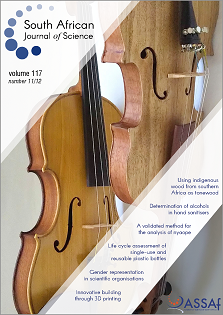Life cycle assessment of single-use and reusable plastic bottles in the city of Johannesburg
DOI:
https://doi.org/10.17159/sajs.2021/8908Keywords:
plastic, life cycle assessment, PET, single-use bottle, reusable bottleAbstract
Polyethylene terephthalate (PET) bottles of water have experienced huge growth in demand and sales in South Africa. This expansion in use creates challenges as well as opportunities for managing the life cycle impact. The properties that make PET desirable for fluid-containing bottles have also made it highly resistant to environmental biodegradation. Reusable plastic bottles are now marketed as a solution to reduce the impact of single-use plastic bottles. We assessed the life cycle impact of single-use PET bottles and an alternative, reusable PET bottle based on consumption patterns in South Africa and the material flow and supply chain in the urban environment. This robust consideration of local conditions is important in evaluating the life cycle impact. In an examination of 13 impact categories, the reusable PET bottle had lower impact than the single-use bottle in all the impact categories examined. The mass of PET bottle material required to deliver the water needs at any given time is a dominant factor on the environmental burden. Extending the life of reusable bottles and designing lighter weight bottles would reduce their life cycle impact. Information obtained in evaluating alternatives to plastic water bottles can be valuable for providing a foundation assessment for policymakers and plastic bottle manufacturers to make informed choices and to focus on improvements in life cycle impact.
Significance:
- The significant impact of the production phase in the life cycle of both single-use and reusable PET bottles confirms the need to design a much more lightweight bottle to reduce the mass of materials used in production.
- Another key consideration was the long transportation distance covered during the production phase, and the negative impact of current vehicular emissions. Municipalities and waste collectors should consider the use of low-carbon transport.
- This study highlights the value of extending the life of plastic bottles, as well as recycling for material recovery, remanufacturing and repurposing these bottles within the City.
- The use of fewer, larger single-use bottles compared with a greater number of smaller single-use bottles is discussed.
Published
Issue
Section
License

All articles are published under a Creative Commons Attribution 4.0 International Licence
Copyright is retained by the authors. Readers are welcome to reproduce, share and adapt the content without permission provided the source is attributed.
Disclaimer: The publisher and editors accept no responsibility for statements made by the authors
How to Cite
- Abstract 2449
- PDF 3425
- EPUB 241
- XML 256












.png)